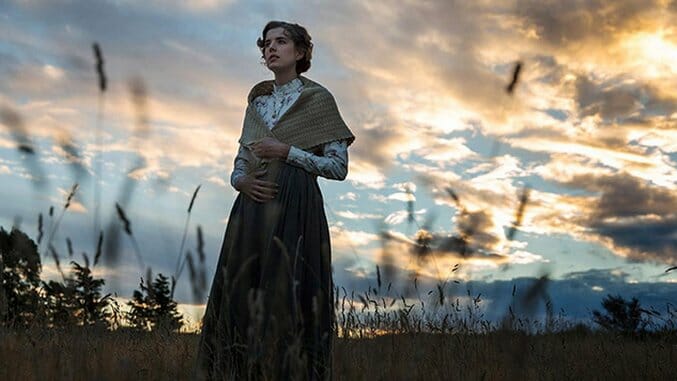Sunset Song

Sunset Song, Terence Davies’ adaptation of Lewis Grassic Gibbon’s WWI-era novel of the same name, is a long-gestating passion project that appears to have over the years of development near calcified in the mind of the filmmaker. A Scottish coming-of-age tragedy about young farmer’s daughter Chris Guthrie (Agyness Deyn), Sunset Song is visually striking and meticulous about period detail, as indeed Davies’ movies often are. But as in his previous misfire, The Neon Bible, both the director’s reverence for the written material and his distaste for spontaneity proves stultifying in the film version.
Too often the film—particularly in its early scenes—feels less like the aching drama it should be, more like a stale tour of some dour museum. Grim events unfold episodically (a rape, a suicide, a paralyzing stroke) and actors move like automata, with only the occasional performer, like Mark Bonnar’s Kaiser-hating Reverend, hinting at signs of life. Even the great Peter Mullan is on his own kind of horrible autopilot, summoning the inner monster he’s deployed so many times before to play Chris’s brutal father, who beats his brood and forces his too-old wife to bear yet more of his petrified children.
Agyness Deyn at least proves her mettle in the lead, hopefully preventing critics from ever again disparagingly referring to her as a “model-turned-actress.” She can be agonizingly raw in the film’s bleakest moments, breaking down when realizing her sorry lot or finally summoning the strength to stand up to the insistently rash and frequently cruel men in her life. It’s Kevin Guthrie as Chris’s beau Ewan, though, who’s the revelation. An hour spent with Guthrie, first compellingly decent then frighteningly volatile as a simple farmer spoiled by the Great War, and you’re regretting his Ewan couldn’t have been more of a focus, that there wasn’t more of him and less of Chris’s relentlessly sour family life dominating the film’s first half.
-

-

-

-

-

-

-

-

-

-

-

-

-

-

-

-

-

-

-

-

-

-

-

-

-

-

-

-

-

-

-

-

-

-

-

-

-

-

-

-








































